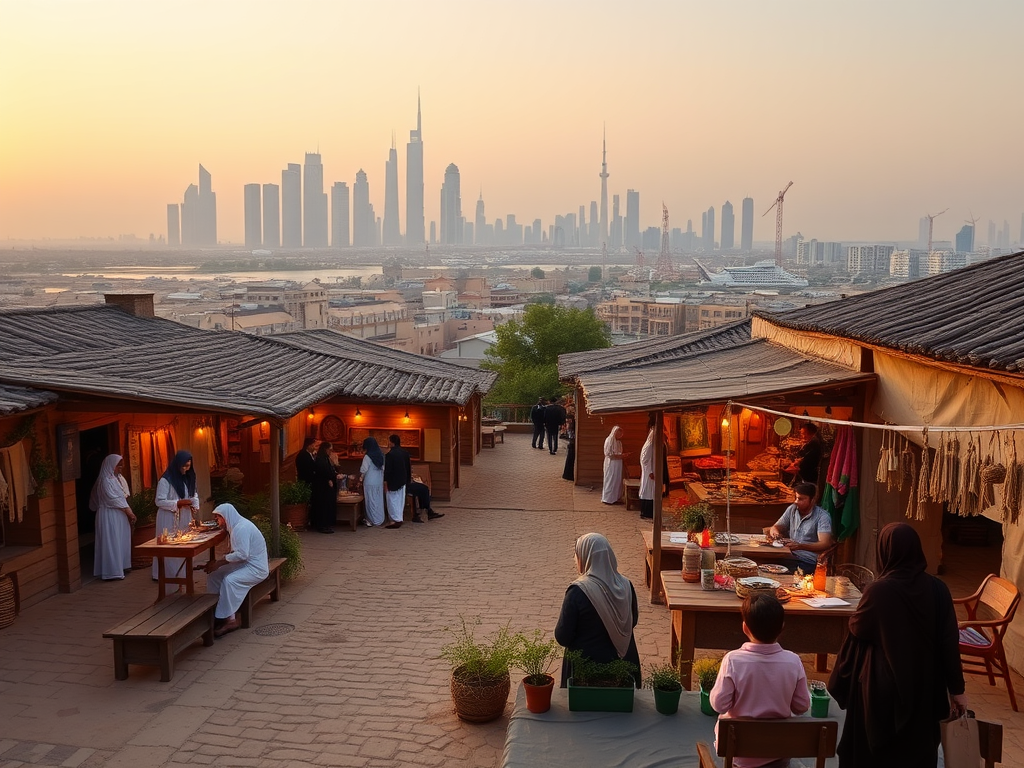Sustainable tourism plays a crucial role in shaping Dubai’s economy by promoting responsible travel that benefits both the local community and the environment. As a city renowned for its luxurious experiences and attractions, Dubai is increasingly adopting sustainable practices, recognizing that maintaining its unique offerings is essential for long-term economic growth. The integration of sustainability into the tourism sector not only boosts the economy but also enhances the city’s global image as a forward-thinking destination. This article explores the key components of sustainable tourism in Dubai, its economic benefits, and the challenges it faces in a rapidly changing world.
Understanding Sustainable Tourism

Sustainable tourism refers to the development and management of tourism that minimizes negative impacts on the environment and enhances the well-being of local communities. In Dubai, sustainable tourism encompasses various aspects, including environmental conservation, cultural preservation, and socio-economic development. The city’s leaders are keenly aware of the need to balance tourism growth with ecological and social responsibilities. The following factors highlight the essence of sustainable tourism in the context of Dubai:
- Environmental Protection: Preserving natural resources and promoting eco-friendly practices.
- Cultural Preservation: Protecting local heritage and traditions while inviting tourists to engage with them.
- Community Engagement: Involving local populations in tourism development for better economic benefits.
- Economic Viability: Ensuring that tourism development contributes positively to the local economy.
- Visitor Education: Providing tourists with awareness and knowledge about the importance of sustainability.
The Economic Impact of Sustainable Tourism in Dubai

The economic impact of sustainable tourism in Dubai cannot be underestimated. Firstly, sustainable practices attract a niche market of eco-conscious travelers, which can lead to increased visitor numbers during the off-peak season. This aspect helps in promoting a year-round tourism model that supports local businesses. Secondly, sustainable tourism encourages investments in green infrastructure, such as renewable energy sources and eco-friendly hotels. This not only reduces operational costs but also creates jobs in installation and maintenance. Lastly, a commitment to sustainability enhances the city’s brand image, yielding economic advantages through increased international visibility, investment, and tourism. Here are few key economic impacts:
- Job Creation: Sustainable tourism helps create jobs across various sectors including hospitality, transportation, and local crafts.
- Increased Revenues: Eco-friendly attractions and experiences can command higher prices, leading to increased revenue for local businesses.
- Diverse Tourism Offerings: Fostering new niche markets, such as eco-tourism and cultural tourism.
- Preservation of Natural Resources: Ensuring long-term viability of tourism-related activities.
- Strengthening Local Economies: Keeping economic benefits within the community through local sourcing.
Despite its advantages, sustainable tourism in Dubai faces several challenges. One significant issue is the competing interests of rapid urban development and environmental conservation. The high demand for luxury services can sometimes compromise eco-friendly practices. Additionally, the influx of tourists can put pressure on natural resources and heritage sites, jeopardizing their sustainability. Moreover, there is often a lack of awareness among visitors about the importance of sustainable practices, leading to unintentional tourism-related damage. The following challenges are noteworthy:
- Balancing Development and Conservation: Finding the equilibrium between growth and sustainability.
- Visitor Awareness: Educating tourists on responsible practices and the importance of sustainability.
- Resource Management: Efficient allocation and management of natural and cultural resources.
- Investment Gaps: Lack of funding for sustainable tourism projects compared to traditional tourism ventures.
- Policy Implementation: Ensuring that regulations promote sustainable tourism while meeting visitor demands.
Conclusion
In conclusion, sustainable tourism is increasingly becoming a cornerstone of Dubai’s economic strategy. By prioritizing eco-friendly practices, cultural preservation, and community engagement, Dubai can continue to attract visitors while ensuring long-term economic and environmental sustainability. The benefits of sustainable tourism extend beyond economics; they contribute to the city’s global reputation and enhance the quality of life for its residents. As Dubai strives to be a leader in sustainable tourism, it must navigate various challenges through collective efforts among stakeholders, including the government, businesses, and citizens. With the right approach, sustainable tourism can foster enduring economic growth while preserving the rich cultural and natural heritage of this incredible city.
Frequently Asked Questions
1. What is sustainable tourism?
Sustainable tourism is an approach to tourism that aims to minimize the negative impacts on the environment and enhance the local community’s well-being while providing enjoyable experiences for visitors.
2. How does sustainable tourism benefit Dubai’s economy?
Sustainable tourism attracts eco-conscious travelers, creates jobs, encourages investment in green technologies, and ensures long-term viability of tourism offerings, contributing positively to the local economy and community prosperity.
3. What challenges does Dubai face in implementing sustainable tourism practices?
Challenges include balancing rapid urban development with conservation, managing tourist resource impacts, educating visitors about sustainability, and securing funding for eco-friendly initiatives.
4. How can tourists contribute to sustainable tourism in Dubai?
Tourists can engage in responsible behaviors such as reducing waste, choosing eco-friendly accommodations, supporting local businesses, and respecting cultural sites and natural environments.
5. What initiatives has Dubai introduced for sustainable tourism?
Dubai has launched various initiatives including sustainable tourism guidelines, investments in renewable energy, eco-certification for hotels, and raising awareness through campaigns focused on responsible travel practices.